A couple of years ago, Microsoft and Epic Games executives were mad at each other. Epic Games CEO Tim Sweeney called out Microsoft because he saw it making moves to close off the Windows 10 store and hurt the openness of the PC.
Sweeney spoke up because he foresaw the arrival of new computing platforms like augmented reality and virtual reality, and he wanted those platforms to remain open. And now Sweeney has changed his tune, throwing Epic Games’ support behind Microsoft’s HoloLens 2 Development Edition, which will begin selling for $3,500 later this year.
He did that because Microsoft did a turnabout and approached HoloLens 2 as an open platform. And Epic Games will launch Unreal Engine 4 support for the hardware by the end of May.
In an interview this week with GamesBeat, Sweeney said the companies had largely solved their differences with it comes to making choices in support of openness.
“Epic loves Microsoft,” he said. “Epic hearts Microsoft.”
Sweeney signaled this rapprochement was coming in a two-minute appearance onstage in Barcelona in February, when Microsoft unveiled HoloLens 2. I talked to Sweeney and Kim Libreri, chief technology officer at Epic, about this shift
Here’s an edited transcript of our interview.
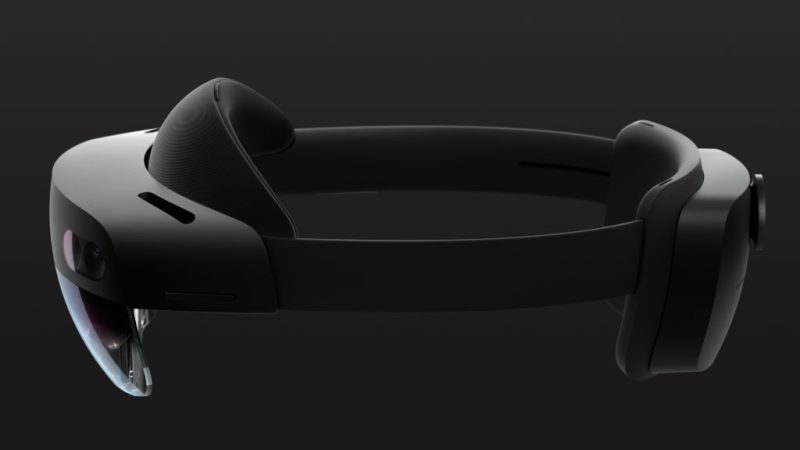
Above: HoloLens 2
GamesBeat: What happened?
Tim Sweeney: How did we get here from a business point of view? Epic has been a big believer in the future of immersive 3d with virtual reality and augmented reality. I’ve been a long believer that in 10 or 15 years instead of everybody in the world having a smartphone and there being millions of smartphones, we’re all going to have augmented reality hardware and we’re going to live in a seamless combination of, of the physical reality and augmented reality.
It’s going to really transform our lives for the better. Epic has been a longtime advocate of open platforms. You may have heard that (laughs). This was the reason that Epic chose to not implement support in Unreal Engine for Microsoft’s HoloLens One. Microsoft made it available through Github to Unreal Engine 4 developers. And so when we heard about one to start a whole new wave of discussions between Microsoft and Epic.
This is in the context of a new generation of Microsoft management in which the company’s been transformed by folks like Satya Nadella and Alex Kipman and Phil Spencer. It’s a new generation at Microsoft. Epic expressed interest in working really closely with Microsoft.
And Microsoft expressed genuine interest in approaching augmented reality as an open platform,
rather than a walled garden like iOS where you can only install apps through their official store and they take out a large fraction of the money.
Approaching augmented reality like Microsoft Windows or Android in which anybody can, any user can download software from any source and there is a lot of competition, a very robust platform ecosystem. That is critically important for AR because AR is going to play a more intimate role in our daily lives than any platform before it.
You know, much more than PCs, smartphones, because this will be some very powerful hardware. And it will have very powerful sensors and it’s going to mean that I mean, really have to be judicious about how we approach this business. It is going to have a much greater demand for trustworthy and fair platforms than previous ones.
Microsoft announced HoloLens 2 is an open platform and Epic went on stage at Mobile World Congress offering our wholehearted support. And so Epic and Microsoft are absolutely committed to working together to make this a great platform, an open platform, with the best 3D tools and capabilities widely available to everybody on great terms.
GamesBeat: That’s good. So it sounds like the conversation focused a whole lot on the HoloLens 2. But do you still have any concerns about the larger Windows platform or have you solved a lot of those concerns by by talking about HoloLens 2?
Sweeney: Microsoft released this Windows RT version which, which blocked competing stores. It’s gone. And now every version of Windows that you can buy everywhere in the world continues to be an open platform. And, there’s a growing recognition throughout the whole industry now the open platforms are an important thing and that we have to continue to prioritize ensuring they remain open, and so Epic is incredibly happy.
It’s the best thing that could have happened this year, in my view that we have a great relationship with Microsoft, again, and that Microsoft’s whole lineup of platforms is based on these (open) principles.
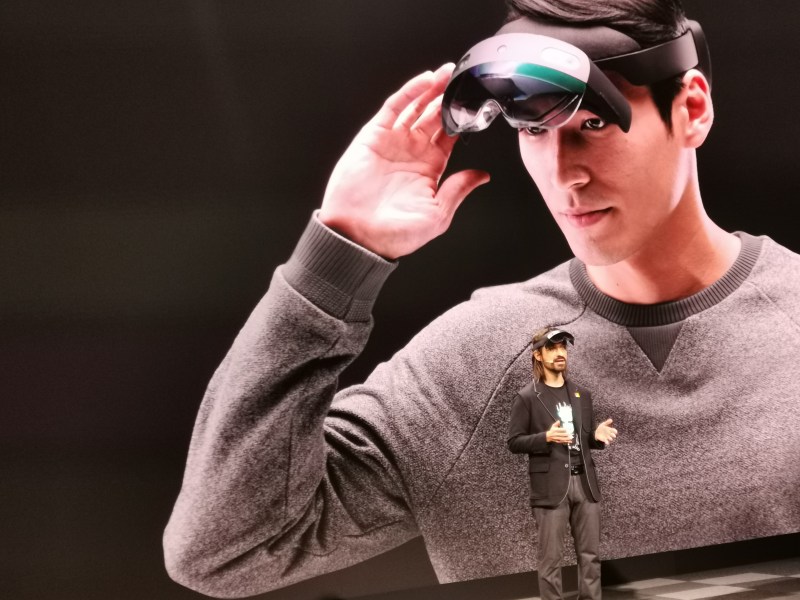
Above: Microsoft’s Alex Kipman with the new HoloLens 2.
GamesBeat: All of this sort of change happened in just a period of a couple of years.
Sweeney: Yeah. I think there was a time when everybody looked at Apple and their monopoly app store and their 30% take of everybody’s revenue with a great deal of envy. Today, that’s being increasingly questioned and there’s a realization that open platforms are more trusted by developers.
Publishers and developers can invest with much greater confidence because we know that we will be able to receive the fruits of our labor, rather than having them being captured by another company charging fees.
This generation of Microsoft management is has been incredibly open in its approach to dealing with the industry and incredibly a forward looking in its adoption of open principles. With GitHub, Microsoft is one of the No. 1 open source contributors in the world.
Microsoft Windows can now run a version of Linux on top of it, and Microsoft Azure has Linux servers. And Microsoft Xbox is open to games like Fortnite interoperating with all platforms, which is has been the case on and off but is now establishing a great new permanent presence. So this is a great new Microsoft management team that I think it is really an awesome position to capitalize on the changing trends in the tech industry, and is ahead of the curve compared to the competition.
GamesBeat: I guess the important thing is that when somebody makes some kind of purchase on the HoloLens 2, they’re not automatically charged some kind of fee.
Sweeney: So what Microsoft announced on stage at Mobile World Congress is that HoloLens 2 will be an open platform in which users can install software of their choosing. They can install third-party stores, they can install games directly from developers, and so Microsoft presumably has a Microsoft Store and it will have terms that Microsoft chooses. But they won’t be the only store. You know, just like on Windows, where there’s a Windows Store, there is Steam, there’s Origin, there’s Battle.net. There’s Epic Games. And you know, having multiple stores keeps every store honest and creates a really healthy competitive dynamic.
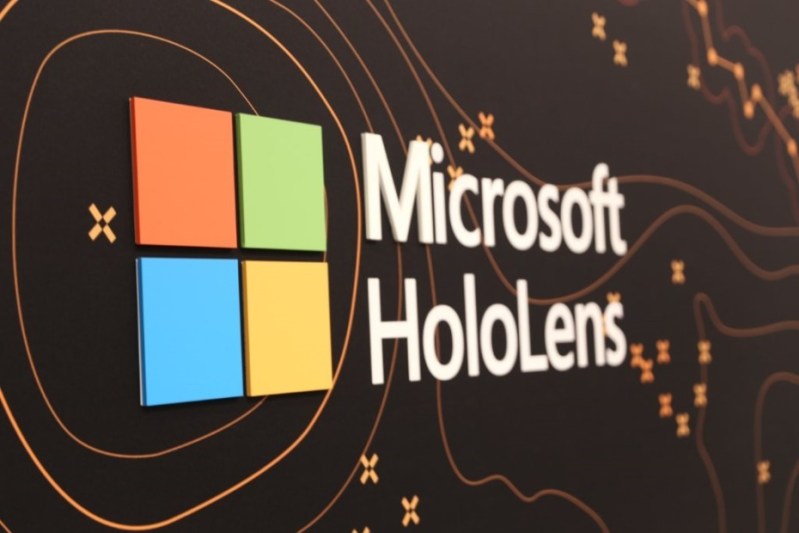
Above: HoloLens is an augmented reality platform.
GamesBeat: So, what more work would you say you guys have to do on the openness front or right now? Are you pretty happy?
Sweeney: Epic is thrilled with everything Microsoft is doing and we feel that we couldn’t be happier with the directions they’ve taken on all their platforms. There’s HoloLens, now an open platform. There’s Windows, a completely open platform. And Microsoft is launching new Microsoft services of all sorts through the Windows Store. And then there’s also Microsoft Game Pass. And those are existing side by side with everybody else’s services. And it’s a really healthy ecosystem, which everybody participates in.
And then there is Xbox. Consoles are a unique thing. They are television-attached gaming devices, as opposed to like general computing platforms. You’re not doing spreadsheets there. And so it was a different experience and also generally consoles over their history are subsidized hardware and so the hardware recoup some money from software sales. Epic is completely satisfied that their economic models are fair.
If a bunch of developers get together and decided to make a console, we would probably do something similar. Funding hardware through software is completely sensible plan. Epic loves Microsoft. Epic hearts Microsoft.
GamesBeat: How much work was it for you guys to do at the HoloLens 2 support?
Sweeney: It’s been a big effort, consuming much of the time of the XR team at Epic, which does virtual reality and augmented reality support. We’re basically supporting HoloLens 2 in May, starting with
Unreal Engine 4.22. In May, we’re going to release support for native apps running on HoloLens, entirely untethered from the outside world. So they able to run wherever you go, without any reliance on any external device.
Kim Libreri: One of the small things that Alex and the team has identified is that, you know, HoloLens, especially in these these early years, is a really great enterprise device. And many enterprise customers would want to use it for design studies and collaboration, training and medical analysis and all sorts of amazing things that AR enables.
And one of the challenges with enterprise is that the data sets can be incredibly huge. If you’re working on a on a corporate data set, an architectural project is quite often going to have polygon counts in the millions. So then from day one, they have this pixel streaming support as well as the native, the native capabilities of the device.
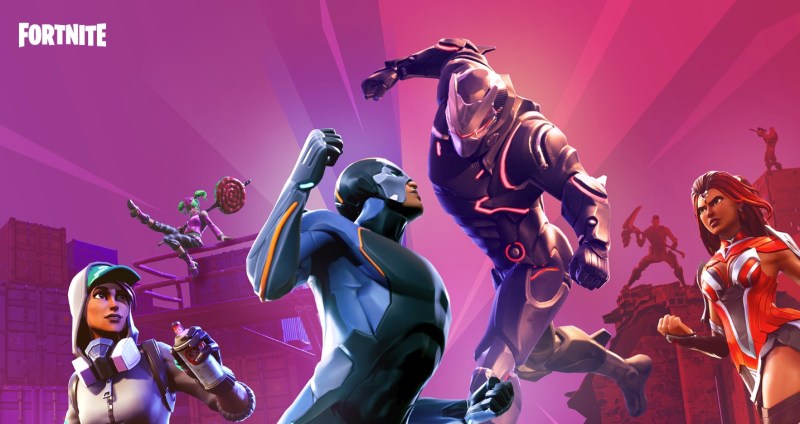
Above: Fortnite debuts on Android.
GamesBeat: How much demand there is going to be for this kind of support. Are you expecting a lot of developers to be interested in HoloLens 2?
Sweeney: Yeah, absolutely. We’ve seen enormous interest, especially among enterprise customers.
There’s an immediate need for highly convenient real-time product visualization that gets you as close to viewing the real product in the real world as possible.
This capability reduces design integration times. Also using augmented reality for training and other applications where you need to learn to do something, and which during the actual thing is incredibly expensive or impossible. Like, anything from astronaut training to medical training to safety procedures.
The augmented reality is incredibly attractive platform to all these folks. Many have been using VR at various stages in their development pipeline.
We see very heavy interest in this platform as a way of solving real-world problems and real companies though.
Libreri: I second that. We’ve seen so many enterprise customers that are really needing professional grade AR to help them take their business to the next level. So I think I think what we’ll actually see is that will get so used to professionals wearing augmented reality devices that it will start to become second nature. When somebody wears one of these, we will know they can see details of the world that they couldn’t otherwise see. I think that you’re going to see a massive, a massive explosion in enterprise use cases.
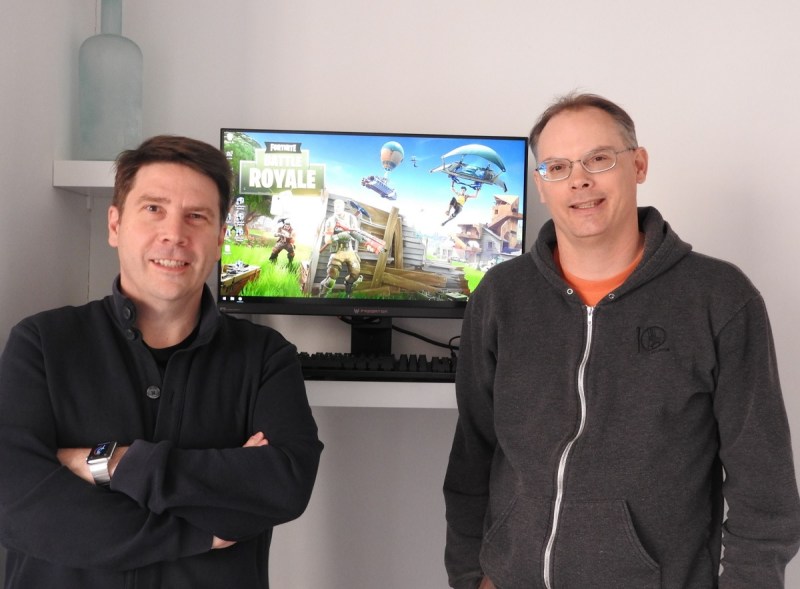
Above: Kim Libreri (left, CTO) and Tim Sweeney (CEO) of Epic Games.
GamesBeat: Are you guys forced to make some tough engineering decisions about where to put your people in order to support platforms? If you compared something like supporting HoloLens 2 or supporting Google Stadia, or supporting some other platform. Is it always like a question of the engineering new resource at hand?
Sweeney: It’s less of a problem now than the previous generations. Fortunately, the continued growth and success of the Unreal Engine and Fortnite is enabling us to go through the biggest growth period in our industry. We have really robust teams supporting all of our engineering across every area. We have platform support efforts in AR, VR, computers, smartphones and other technologies.
There’s no questions that HoloLens 2 has been a high priority ever since we got word that Microsoft was going to approach it as an open platform.


